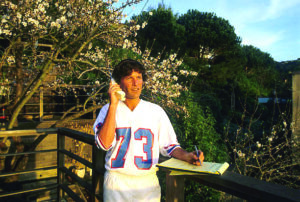By David Mullen
“I learned everything I needed to learn about negotiation from Ronald Reagan.”
Not exactly the admission one would expect from Leigh Steinberg, the antiestablishment 1960s UC Berkeley student turned America’s first “Sports Super-Agent” and the inspiration behind the box office smash “Jerry Maguire.”

Photos courtesy of Ericho Communications
“I get there [Berkeley] my first year and in the first quarter,” Steinberg said, “[Gov.] Reagan suspends the independent classes, so we have demonstrations every day and the CHP [California Highway Patrol] and Alameda County Sheriffs are there. Then in my second quarter, we have the fight for the third world, so we have the CHP and the Alameda County Sheriffs there. And in the third quarter is People’s Park. So, we get occupied by the U.S. Army with tanks and bayonets. It was a different time back then.”
Steinberg, a Los Angeles-native, was elected president of the Associated Students of the University of California at Berkeley, earned a B.A in political science and graduated with a law degree that he would parlay into fortune and later fame.
“I was a dorm counselor for underclassmen, and they moved the football team into the dorm,” Steinberg recalled. “And one of the students was Steve Bartkowski, the quarterback. In 1975, he gets picked first [in the NFL Draft] by the Atlanta Falcons. After I graduated from law school, I traveled the world for a year. I came back to choose between different jobs. ‘Do I take a job in TV news or take a political job or do I work for the Alameda County DA? That is the job I probably would have taken.
“But Bartkowski asked me if I can represent him. There was no established field of sports agentry at that point. As a matter of fact, there was no guaranteed right of representation. So, someone like [Cincinnati owner] Mike Brown of the Bengals could just hang up the phone — as he did on me — and say, ‘We won’t deal with agents.’ It was rudimentary and embryonic at that point.” Steinberg ended up negotiating on behalf of Bartkowski and secured the largest rookie contract in NFL history, a four-year deal worth $650,000 and the business of sports representation began.
“We arrive in Atlanta to sign the contract the next day,” Steinberg said, “and there were klieg lights in the sky, a huge line of people pressed up against the police line and I hear in the background ‘We interrupt the Tonight Show with Johnny Carson to bring you a special news bulletin.’ It was a revelatory moment. Coming from Berkeley, I saw the intense idol worship in which generational athletes were held in communities across the country. They were the movie stars and the celebrities. I hadn’t quite seen that fervor before.”
But for Steinberg, it wasn’t about saying “show me the money” as Rod Tidwell coined in “Jerry Maguire,” the Academy Award-winning film loosely based on Steinberg’s life. He needed to find athletes that understood their power was formidable and potentially fleeting.

“My dad had raised me with two core values: one was to treasure relationships — especially families — and the other was to make a meaningful effort to help people that can’t help themselves,” Steinberg, 72, said. “I saw that athletes could be role models and trigger imitative behavior.
“I believe we can address any problem through the power of sports from domestic violence to sex trafficking to bullying to racism to the environment. When we had the heavyweight champion, Lennox Lewis, do a public service announcement that said, ‘Real men don’t hit women,’ it did more to address that attitude of rebellious adolescence toward domestic violence than 10 authority figures ever could.”
Steinberg makes sure that his clients give back to the youth in their community, help their church, set up a scholarship fund at high school, participate in local Boys & Girls Clubs, execute programs at their university or create a charitable foundation with local community and business leaders. His client and personal philanthropic efforts “came from the values I was raised with and, of course, that was reinforced by Berkeley.”
After it became clear to him that an athlete could make a difference off the field, Steinberg looked for traits. “I profiled them,” Steinberg said. “I realized early on that the type of player that would relate had a philosophy that was more holistic and that focused on a second career and role modeling. It was going to have to be a special type of young man that had good values, was grounded, had a caring heart and had a vision for the long-term.”
With partner Jeff Moorad, Steinberg established Steinberg, Moorad & Dunn, whose clients included Steve Young, Howie Long and Dallas legend Troy Aikman. The normally reserved Aikman, the player, blossomed into a top pro football analyst as Aikman, the ex-player. “There were all sorts of controversies surrounding the team,” Steinberg said. “We realized early on that he needed to be the beacon of stability and not voice his opinions because he is very opinionated. He approached his media [position] like he did as a quarterback. Very seriously.”
Steinberg’s track record of success is undeniable. “In football, I’ve done 64 first round draft picks and had the No. 1 overall pick eight different years. We have 12 players in the Hall of Fame.” He was a technical consultant on Cameron Crowe’s “Jerry Maguire” starring Tom Cruise, Oliver Stone’s “Any Given Sunday” starring Al Pacino, and “For the Love of the Game” starring Kevin Costner. He has also worked as a consultant on “Arli$$,” an underappreciated HBO series about a sports agent.
He was on top of the sports world. Steinberg appeared on “60 Minutes,” “The Today Show,” “Larry King Live” and “Real Sports with Bryant Gumbel.” He was featured in Sports Illustrated, People, Playboy and GQ. His Super Bowl parties were legendary. He sold his business in October 1999 for a reported $120 million because of a “fundamental shift in the industry.” The “shift” included the evolution from representing players to selling properties like leagues, logos, teams, equipment, shoes and video games. As he got involved in some ambitious sports related ventures, his life began to spiral. Legal issues with his previous business cost him millions, forcing bankruptcy. His family life was crumbling. And he became addicted to alcohol, leading to arrests.
“I had a pretty charmed life,” Steinberg said, “saving sports teams [he was key in the Giants remaining in San Francisco in 1992], being in movies and writing best-selling books [including Winning with Integrity: Getting What You Want Without Selling Your Soul,] and I came to a point where my two kids were diagnosed with retinitis pigmentosa. My father died, who was a central figure in my life. We lost a home in Newport Beach to mold and had to move out with one day’s notice. I started having problems in my marriage. I had shut my office, turned the practice over, shut my condo down and was at my parent’s home sitting on my deceased father’s bed and my brain said, ‘Where can I find more vodka?’ I had an epiphany at that point that I wasn’t doing a great job of living up to my father’s admonitions.”
Steinberg went into sober living, enrolled in the 12-step program and has not had a drink in 12 years. He is also back in the sports business and ventured to Dallas to explore the eSports phenomenon. “In my early days, I might have spent two hours talking to an athlete. Today’s, I am not going to bet I get more than 30 minutes.” Like the Bob Dylan song popular when Steinberg was in college, “for the times, they are a-changin.’”
Steinberg is still representing athletes, including Kansas City Chiefs superstar quarterback Patrick Mahomes, whose recent contract extension is a reported 10 years that could earn him up to $503 million.
“His [Mahomes] parents did a good job raising him. He grew up grounded,” Steinberg said. “He is also personally ambitious and thought of going to law school. You like him on the field, but you love him even more off the field. He cares about other people, is inquisitive and unfailingly gracious. He has a real charitable heart. He cares about things and people.”
After more than 41 years in the game, Steinberg may have finally found his ideal client.
